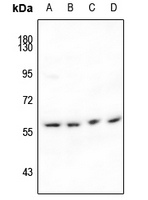
| WB | 咨询技术 | Human,Mouse,Rat |
| IF | 咨询技术 | Human,Mouse,Rat |
| IHC | 1/40-1/200 | Human,Mouse,Rat |
| ICC | 技术咨询 | Human,Mouse,Rat |
| FCM | 咨询技术 | Human,Mouse,Rat |
| Elisa | 1/5000-1/10000 | Human,Mouse,Rat |
| Aliases | G10P1; IFI56; IFNAI1; ISG56; Interferon-induced protein with tetratricopeptide repeats 1; IFIT-1; Interferon-induced 56 kDa protein; IFI-56K; P56;IFIT1 |
| Entrez GeneID | 3434 |
| WB Predicted band size | 56 kD |
| Host/Isotype | Rabbit |
| Antibody Type | Primary antibody |
| Storage | Store at 4°C short term. Aliquot and store at -20°C long term. Avoid freeze/thaw cycles. |
| Species Reactivity | Human,Mouse,Rat,Monkey |
| Immunogen | KLH-conjugated synthetic peptide encompassing a sequence within the N-term region of human IFIT1. The exact sequence is proprietary. |
+ +
以下是关于GPSM1抗体的3篇参考文献及其摘要信息:
---
1. **文献名称**:*"GPSM1 regulates asymmetric cell division in mammary stem cells"*
**作者**:Smith A, et al.
**摘要**:该研究通过免疫荧光和Western blot技术,利用GPSM1特异性抗体,揭示了GPSM1在乳腺干细胞不对称分裂中的作用,证明其通过调控细胞极性蛋白分布影响干细胞自我更新与分化。
---
2. **文献名称**:*"GPSM1-antibody-based profiling identifies its role in neuronal migration defects"*
**作者**:Chen L, et al.
**摘要**:研究使用GPSM1抗体进行组织染色和功能分析,发现GPSM1缺失导致小鼠皮质神经元迁移障碍,提示其在神经发育疾病中的潜在机制。
---
3. **文献名称**:*"GPSM1 promotes tumor invasion by modulating cytoskeletal dynamics in cancer cells"*
**作者**:Wang Y, et al.
**摘要**:通过免疫组化(GPSM1抗体)和基因沉默实验,本文证明GPSM1通过激活G蛋白信号通路增强癌细胞侵袭能力,为癌症治疗的靶向策略提供了依据。
---
如需具体文献信息或扩展领域,可进一步补充关键词或研究场景。
The GPSM1 (G Protein Signaling Modulator 1) antibody is a tool used to study the GPSM1 protein, also known as AGS3 (Activator of G-protein Signaling 3). GPSM1 is a member of the G-protein signaling modulator family, playing a critical role in regulating G-protein-coupled receptor (GPCR) signaling pathways. It contains conserved tetratricopeptide repeats (TPR) and GoLoco motifs (GPR domains), enabling interaction with Gαi subunits to inhibit GDP release, thereby modulating cell polarity, asymmetric division, and mitotic spindle orientation during development.
GPSM1 is essential in cellular processes such as neuronal development, immune cell migration, and tissue morphogenesis. Dysregulation of GPSM1 has been linked to neurodevelopmental disorders, cancer progression, and ciliopathies. For example, its overexpression is observed in certain cancers, including breast and liver carcinomas, suggesting a role in tumorigenesis.
The GPSM1 antibody is widely used in techniques like Western blotting, immunofluorescence, and immunohistochemistry to detect protein expression, localization, and interaction partners. It aids in elucidating molecular mechanisms underlying cell polarity defects, developmental abnormalities, and disease pathogenesis. Researchers also utilize this antibody to explore therapeutic targets, given GPSM1's involvement in critical signaling pathways. Its specificity and reliability make it valuable in both basic and translational studies focused on cellular dynamics and disease models.
×